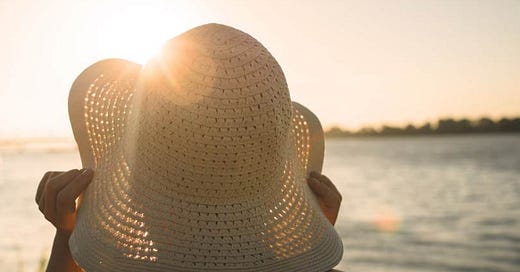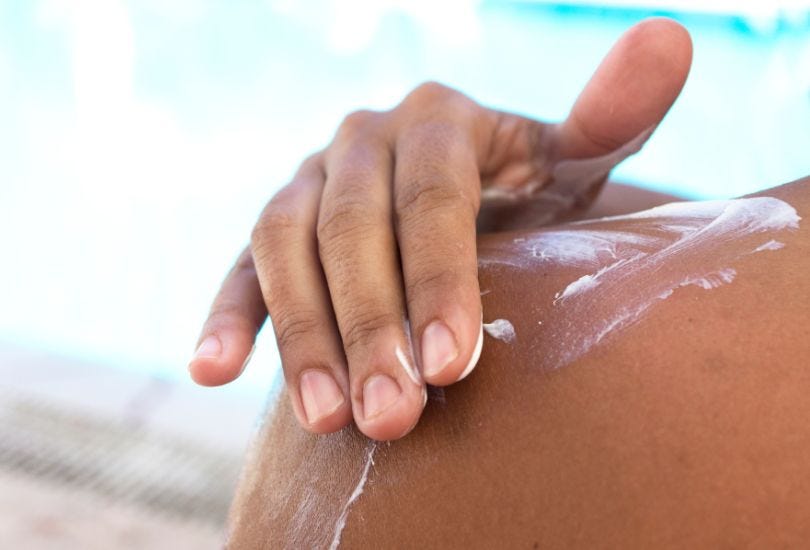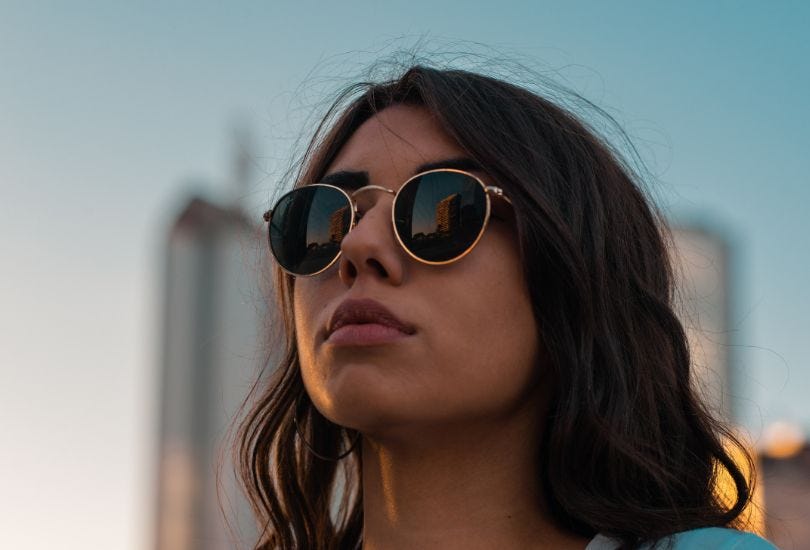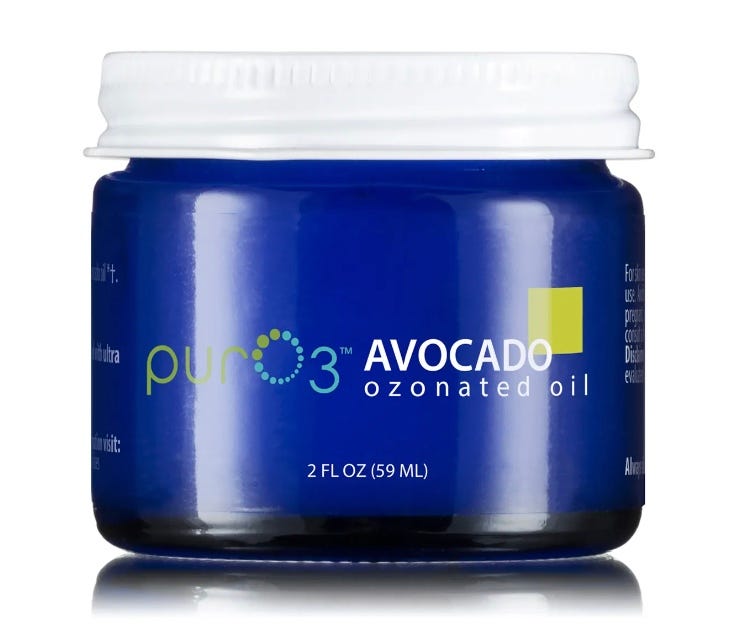5 Reasons To Quit Sunscreen (The Benefits of Sun Exposure)
Sunlight has been the target of a smear-campaign. Let's shine light on the truth ☀️
I used to be terrified of the sun. Even on overcast days, I slathered SPF 30 on my face because I believed “harmful rays” would cause premature aging (whatever that means) and skin damage. During summer months, I kept myself thoroughly covered due to my skin’s susceptibility to sunburn.
Then, I started questioning the propaganda around “dangerous” sun exposure. Just as in the realm of nutrition, mainstream sources and “experts” peddled scientifically backwards advice about sunlight. They created fear around health-promoting choices, and encouraged choices that sabotaged health.
The more I’ve learned, the more I’ve turned from sunphobe into sun-lover.
Here are 5 pieces of information that led me to quit sunscreen.
1. Sun exposure correlates to increased longevity
“Common knowledge” says that sun exposure causes skin cancer (melanoma). But is it possible that melanoma, like other forms of cancer, is caused by modern diets and lifestyle? Is it possible our ancestors got much more sun exposure, yet suffered lower (or negligible) of melanoma?
One study tracked the sun exposure of 30,000 Swedish women for 20 years. The results showed women who strictly avoided the sun during that period had a two-fold greater risk of early death than women who got sun exposure.
Another study observed the habits of 38,000 Swedish women. It showed women who got sunburned twice or more per year during adolescence had a reduced all-cause mortality, compared with women who had been sunburned once or less.
This study showed a reduced risk for all-cause mortality in women who went on sunbathing vacations more than once a year over three decades.
Importantly, these studies show correlation, not causation. For example, it’s possible that women who went on sunbathing vacations had higher income, and could afford healthier lifestyles. But we can use correlational data to prompt further exploration.
Notably, these observational studies tracked Swedes, who typically have fair skin. Those with darker complexions are even more resilient to sun exposure, requiring more sun exposure to produce healthy levels of vitamin D.
2. Sunscreen blocks beneficial rays of sunlight
The sun carries UVA rays (longer wavelengths) and UVB (shorter wavelengths) to earth. Both wavelengths cause tanning, while UVB wavelengths cause burning. UVB also causes vitamin D synthesis.
Sunscreens block UVB, preventing burning. Yet this also blocks vitamin D synthesis. And vitamin D is essential to optimal immune function, including your body’s ability to fight cancerous cells.
One meta-analysis showed that sunscreen use correlated with increased melanoma, in those who lived in northern hemispheres (with less UV rays from the sun, compared to regions close to the equator).
Another meta-analysis showed that sunscreen use neither increased nor decreased the risk of melanoma.
Ironically, though sunscreen is touted as the remedy to prevent skin cancer, most sunscreens contain highly toxic ingredients shown to cause cancer. Common carcinogenic preservatives added to sunscreens include parabens and BHT.
Further, the active ingredients in chemical sunscreens, such as oxybenzone and octinoxate, are linked to hormone disruption and allergenic effects.
Tanning is a desirable result of sun exposure, because the melanin (skin pigment) produced by tanning actually protects your skin against the sun. That’s why the more tan you are, the less susceptible you are to burning.
Researcher Stephan Guyenet explains,
“Tanning is a protective response (among several) by the skin that protects it against both UVA and UVB. Burning is a protective response that tells you to get out of the sun.”
The “happy medium” is getting unprotected sun exposure, but not until the point of burning your skin.
Every summer, I gradually increase my sun exposure to gradually build up my skin’s resistance to burning. Once, I thought my ultra-fair Scandinavian skin was impervious to tanning. But now, I’ve found I can build up a slight tan, and the more color I develop, the more time I can spend in the sun without burning.
3. Sunglasses impede your body’s ability to tolerate sun exposure
When our eyes are exposed to sunlight, it signals the pituitary gland to produce MSH — melanocyte-stimulating hormone. This biochemical tells your skin to produce melanin, which produces a tan and protects against sunburn.
Sunglasses impair this hormonal-feedback circle. The pituitary doesn’t get the message to increase melanin production, and that increases likelihood of sunburn.
So, especially when you are sunbathing, avoid wearing sunglasses!
As I’ve reduced my use of sunglasses (I use them only rarely now), I’ve found my eyes have become less sensitive to the sun.
Interestingly, adrenal health plays a significant role in your eyes’ ability to tolerate bright light. In my nutritional training, one of the assessments taught for adrenal health involved shining a flashlight into the client’s eyes in a dark room.
If their adrenals were shot, their pupils couldn’t hold a contraction (ideally, the pupils should stay contracted in response to bright light). This would create light sensitivity.
If your eyes are extremely sensitive to sunlight, it can indicate adrenal exhaustion. You might consider practicing basic adrenal support.
If your ancestors lived near the equator, they likely passed down their dark skin and dark eyes, which are resilient to intense sunshine. Just like fair skin, however, fair eyes are often more sun-sensitive.
If you have light-colored eyes, it may be important to shade your eyes from severe sun. You can check out the comments on this Instagram post from Carnivore Aurelius, where a few people mention their light-colored eyes being harmed because they lived in equatorial regions and didn’t protect their eyes.
4. Dietary changes support resilience to sunburn
I’ve heard a common theme from my friends and colleagues, as they’ve transitioned from the Standard American Diet to a more ancestral diet. They notice their skin becoming more resilient to sunburn, and more easily tanned.
Primarily, they reduced their intake of the seed oils used so prevalently in processed foods (such as canola, soybean, corn, safflower, and sunflower oils). These oils contain primarily polyunsaturated fats (omega-6’s) which create free radical damage and induce inflammation.
Then, they increased their consumption of nutrient-dense fats from grass-fed animals, pastured eggs, butter, and grass-fed dairy. These sources contain beneficial cholesterol (yes!) and essential fat-soluble vitamins.
Reducing seed oils and increasing healthy saturated fats supports reduced inflammation and better immune function. Perhaps this is why people report more resilience to sunburn, after making these dietary changes.
It turns out, some research supports this common anecdotal experience. Linoleic acid, a polyunsaturated fat found in seed oils, is shown to decrease melanin levels. Decreased melanin = less tanning and more burning.
Topical oils aid skin vitality after sun exposure
I find that my skin health and vibrancy improves with regular sun exposure, followed directly with an application of a healthy oil.
I particularly love the oxygen-infused oils, also called “ozonated oils.”
I typically apply a mixture of ozonated jojoba oil and ozonated avocado oil after sunbathing, for skin health.
If you do get burned, ozonated oils can drastically support skin recovery.
Due to the oxygen content, the shelf-life of the oils is about 3 months. Keep them in the fridge to best preserve the oxygen. (I get ozonated oils from PureO3.com.)
If you struggle with acne, scarring, or eczema, you may find the combination of sun exposure followed by ozonated oil to be extremely healing.
Happy sunbathing!
Note: I originally published this article at my holistic website EmpoweredSustenance.com.
FREE REPORT: The Hidden Truth About Cancer Screenings
I just released a free report on the hidden data of cancer screenings.
This information is why I avoid all cancer screenings, from mammograms to pap smears to melanoma biopsies.
This report contains medical data your doctor won’t tell you… and likely doesn’t even know.
Fear is incomplete knowledge. There exists so much fear around cancer because people lack knowledge about how the body works, and how it heals.
I hope this information reduces fear and increases empowerment around a highly-charged topic.
STAY IN TOUCH
MY BOOKS + GUIDEBOOKS
The Scorpion and The Lion | Whistleblower Exposé
The Invisible Corset | Heal the Relationship with Your Body
Beyond The Rulebook | 30-Day Writing Journey For Life Clarity
[FREE] 100 Facts Your Doctor Won’t Tell You About Vaccines | Scientific and Historical Data
[FREE] A Few Practical Steps to Enjoy The Apocalypse | Workbook for Awakening
[FREE] The Master List Of Natural Remedies | Holistic Protocols for Chronic Health Problems
Thanks for your support, and thanks for sharing!










